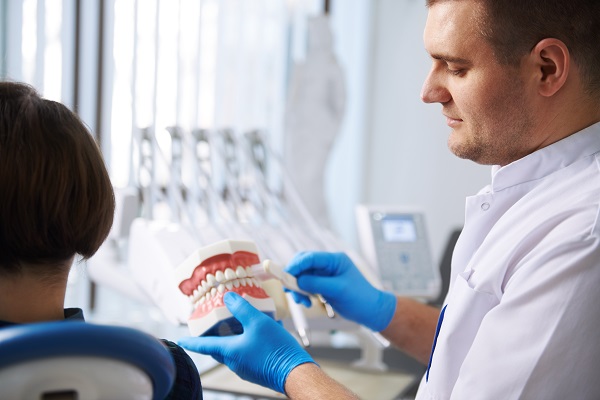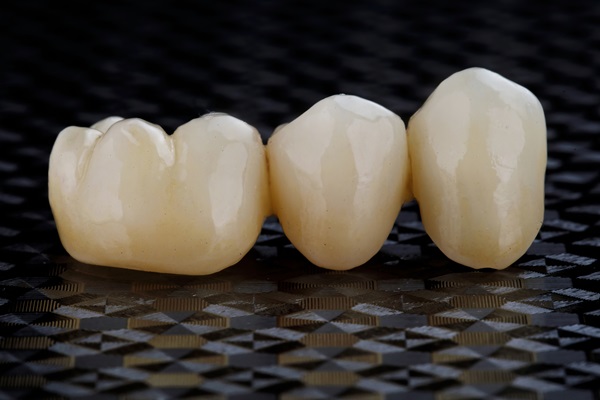How Gum Disease Causes Damage to Soft Tissue and Bone

Want to understand what gum disease can do to one’s mouth? Once someone is diagnosed with this oral disease, there are many ways it can cause them to experience bad overall dental health. Patients who are diagnosed can ask their general dentist any specific questions they have about preventing and treating gum disease, as prevention is the key to good oral health.
How gum disease starts
Understanding how gum disease starts is a great idea, as this can help dental patients know how to prevent themselves from being diagnosed with gum disease in the first place. There are four main stages of gum disease: gingivitis, slight periodontal disease, moderate periodontal disease and advanced periodontal disease. Gingivitis is the first stage, which starts due to poor oral care habits. When one’s teeth are not properly cared for, plaque will begin to build up, which turns into a hard substance known as tartar. When gum disease is not addressed in a timely manner, it will eventually cause damage to one’s soft tissues and bone tissue.
Untreated gum disease
When gum disease goes untreated, it will not go away and instead will only continue to worsen over time. This is due to the ongoing infection in one’s mouth, which means their mouth is full of bad bacteria. Infections also cause inflammation, which further declines one’s oral health. The fact that gum disease can cause many different types of damage to one’s mouth makes it essential to make regular dental appointments to ensure one’s oral health is in good shape.
Soft tissue damage
Gum disease will eventually cause damage to one’s soft tissues in the mouth, which essentially means that they will lose a certain amount of gum tissue. Gum recession is to be avoided, as when the gums begin to recede, there is not only a loss of gum tissue, but it also exposes the roots of one’s teeth which can lead to their experiencing even more problems. When the gum line begins to recede, they may be in need of a soft tissue graft in order to repair any soft tissue damage.
Bone damage
Cases of severe gum disease often lead to one experiencing bone damage. This type of damage occurs when one experiences deep pockets of gum disease, which will eventually lead to their experiencing some degree of bone loss. It is possible for an experienced dentist to recontour the bone by performing pocket reduction surgery. Since it is possible for gum disease to destroy the bone surrounding the roots of the teeth, when this type of damage happens, bone grafting is often the next step.
Is gum disease damaging your mouth?
Now that you have read the above information, it is understood that gum disease can damage the soft tissues in the mouth, as well as the bone. Since experiencing any type of mouth damage means one does not have a healthy mouth, it is essential for everyone to make regular dental check-up appointments to be aware of the current health of their gums.
Request an appointment here: https://ismiledentalspa.com or call iSmile Dental Spa at (916) 241-4191 for an appointment in our Carmichael office.
Check out what others are saying about our dental services on Yelp: Gum Disease in Carmichael, CA.
Recent Posts
Dental bridges replace missing teeth, restoring smile appearance and bite function. They are noninvasive tooth replacements that rely on the surrounding teeth or dental implants for support. A general or cosmetic dentist will create a dental bridge custom-fit to the patient’s smile, ensuring a natural-looking restoration and optimal oral health.Dental bridges are named for the…
For dental emergencies, people can go to an emergency dentist or an emergency room. However, several things should be considered before deciding where to seek medical help. Just like any other medical emergency, dental emergencies also require different levels of care. This depends on their severity. The ideal place to go for treatment when you…
Dental veneers and dentures are among the most common treatments that dental providers use to restore patients' smiles. Veneers are thin shells that fit over natural teeth to improve their appearance, while dentures replace missing teeth and restore oral function. Although these treatments serve different purposes, they can sometimes work in combination through a smile…
Implant supported dentures are often ideal for a person with missing teeth who has enough bone to support implants. Dental implants have become immensely popular because of the host of benefits they offer. Implants can support a denture, bridge, or crown. Keep reading to learn more about the advantages of implant supported dentures.Implants are artificial…


